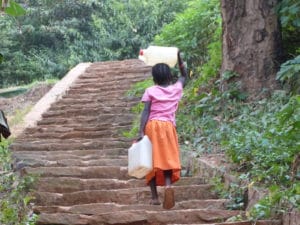Tomorrow's water
Working with universities in the South to help African students learn about water management: that's the idea behind a new project called MAREMA.[1]. This Erasmus + program, piloted by the University of Montpellier, will be launched on November 16.
 By 2030, more than half of Africa's population will live in cities. The main thing these megacities have in common is a very high demand for water... "...In large cities, drainage systems are sometimes deficient. The poorest populations are generally the most vulnerable. Lacking the means to do so, they occupy areas of the city left vacant because of the risks involved (gullies, flood-prone low points, steeply sloping areas)". explains Professor Bamory Kamagaté, from Nangui Abrogoua University (Côte d'Ivoire).
By 2030, more than half of Africa's population will live in cities. The main thing these megacities have in common is a very high demand for water... "...In large cities, drainage systems are sometimes deficient. The poorest populations are generally the most vulnerable. Lacking the means to do so, they occupy areas of the city left vacant because of the risks involved (gullies, flood-prone low points, steeply sloping areas)". explains Professor Bamory Kamagaté, from Nangui Abrogoua University (Côte d'Ivoire).
Precious and capricious
Water and Africa: a story as old as time. On the continent where humanity was born, water is not just a problem by default. Risks may arise from difficult access, but they can also arise from excess. "The countries we work with in Central and West Africa experience very intense rainfall, and therefore periods of heavy flooding" describes MAREMA project coordinator Valérie Borrell Estupina from the University of Montpellier, citing as an example the streets of Yaoundé (Cameroon), regularly transformed into veritable torrents.
Other problems linked to water management include environmental pollution and the risks incurred by local populations. Sanitation, wastewater management and treatment, poorly controlled discharges, the spread by floods of chemicals used in agriculture... All in all, the technical and scientific challenges associated with water management are as numerous as they are complex. And they present very worrying prospects for the development of Africa's major cities...
Montpellier's expertise in water sciences
The MAREMA project aims to transplant to African soil a teaching method that has proved its worth in France. "The University of Montpellier's multi-disciplinary Master's degree in "Water Sciences" brings together a wide range of very different disciplines: hydraulics, of course, but also physics, biology, chemistry, human and social sciences and geology. In fact, it is the only one of its kind in France", adds Valérie Borrell Estupa.continues Valérie Borrell Estupina, director of the master's program.
It's an extremely attractive project for the universities in the South of France, who were fully involved in its construction from the outset. "It's also generating a lot of interest in the Northsays Eric Servat, Director of the Institut Montpellierrain de l'Eau et de l'Environnement, which represents the laboratories involved in the project. Indeed, we're offering European researchers a new field of discovery: in constant evolution, the master's degree in water sciences is based on a wealth of research work."
Benin, Ivory Coast and Cameroon
Backed by research teams and enriched by an analysis of labor market needs, the MAREMA project is based on existing master's degrees at partner universities in the South: these will be gradually upgraded to create a common course in Benin, Côte d'Ivoire and Cameroon.
With a budget of almost €800,000, the program is due to run until the end of 2019. The end result is a fully operational Master's degree in water sciences. And economic benefits for the countries concerned: "these training courses meet a strong need in the African job market in the face of major environmental and societal challenges. The project also involves a number of industrial partners. We can be sure that the students in this new program will have no trouble finding a job", says David Sebag, an expert in this field. says project expert David Sebag.
Main partners
- Agence Universitaire de la Francophonie, Belgium
- Institute of Research for Development, France
- Institut National Polytechnique Houphouët Boigny, Ivory Coast
- University of Abomey Calavi, Benin
- Catholic University of Leuven, Belgium
- University of Barcelona, Spain
- University of Montpellier, France
- Grenoble Alpes University, France
- Nangui Abrogoua University, Ivory Coast
- University of Ngaoundéré, Cameroon
- Yaoundé I University, Cameroon
[1] Master in Water Resources and Environmental Risks in African Metropolises
Photo credit: Floriane Celle